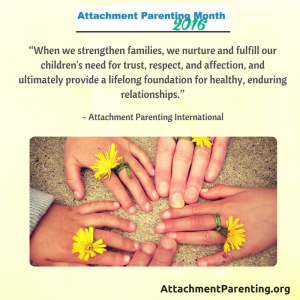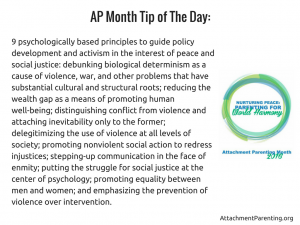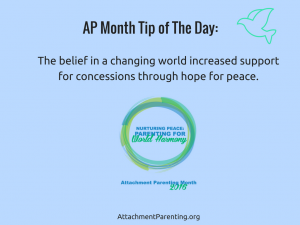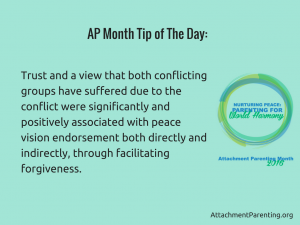Category: APtly Said
Peace in the home: A look at domestic violence and “normative” abuse
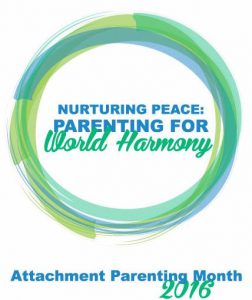 Peace is something I take very seriously, in my life and in my home. It is no afterthought here. It is intentional every moment of every day.
Peace is something I take very seriously, in my life and in my home. It is no afterthought here. It is intentional every moment of every day.
I follow API’s Eight Principles of Parenting so closely, because they reflect my values so closely — the values I want to pass down to my children, the values I want them to express to the children and adults around them, the values I want them to choose in a potential spouse.
It has never escaped me that AP Month falls on Domestic Violence Awareness Month every year, each October. But this year’s theme is especially close to me, being a domestic violence survivor myself and now working in the field as an advocate: “Nurturing Peace: Parenting for World Harmony.” I take this theme to heart with every interaction with my children, and work to support other parents in having more peaceful, meaningful relationships with their children.
It is my sincere belief that how we raise our children can change the world, and if we go the extra mile, so to speak, to teach them healthy relationship and peaceful conflict resolution skills, that they will “pay it forward” with their life choices. They can at least change the legacy of their family tree, though I am far from giving up hope for the next generation with API’s influence.
Domestic Violence is Not Rare
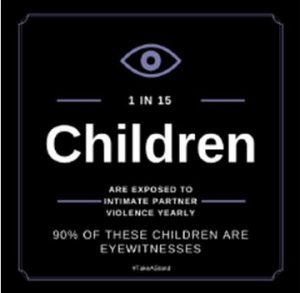 We would like to hope that the statistics don’t apply to API families — that 1 in 3 of all women (and 1 in 4 men) are victims of physical domestic violence sometime in their lifetime — but sadly, these statistics know no boundaries. Likely, in your group of friends, there is at least 1 domestic violence survivor among you.
We would like to hope that the statistics don’t apply to API families — that 1 in 3 of all women (and 1 in 4 men) are victims of physical domestic violence sometime in their lifetime — but sadly, these statistics know no boundaries. Likely, in your group of friends, there is at least 1 domestic violence survivor among you.
While men can become victims of domestic violence, I want to focus on women.
You likely won’t know who she is. Women of all ages, income classes, educational levels, social statuses, races, ethnicities, cultures, and personalities are affected. While there is a certain psychological profile typical of most abusers, there is none for victims. Any woman could find herself in that position.
She won’t be forthcoming with information, either. Being a victim of domestic violence creates a lot of strong emotions, such as shame and embarrassment and confusion. She won’t talk easily about it, to just anyone.
If you see bruises, she’ll explain them away with some common cause, such as being clumsy. It’s not that her home life really isn’t that bad — no one deserves any level of abuse, so it’s all that bad — it’s that she feels alone and like no one will understand or believe her, or be able to or want to help her anyway. It’s complicated and impossible to fully understand unless you’ve been there.
We can hope and pray that she feels comfortable enough with someone to open up and confide in. Perhaps she will call the national or local hotline for domestic violence survivors.
1-800-799-7233
National Domestic Violence Hotline
Hopefully, she won’t suffer in silence. But many do.
What is Domestic Violence?
When we think of domestic violence, often we think of physical abuse — the hitting, pushing, punching, and other stereotypical behaviors of characters we see on TV and in the movies. We may or may not think of the shows we’ve seen of women being killed. We may think this is extreme, but the fact is: It’s not uncommon for abused women to be in grave danger in their relationships.
If we think a little deeper, we may think of sexual and verbal abuse as part of domestic violence. Finally, we may get down to emotional abuse.
A lot of people think that emotional abuse isn’t as bad as physical abuse, or sexual abuse, or even verbal abuse. But it’s not really that any type of abuse is more or less severe than another. Abuse lies on a continuum, and abusers tend to use more than one type of abuse to control their victims. Here’s the thing: If a person is being emotionally abusive, he is on the continuum — the same continuum that, on the other end, includes being physically abusive up to and including killing his partner. This is no exaggeration: All types of abuse are about control and intimidation, all types of abuse are about violating and devaluing another person, and once you cross that line in any way, you are fully capable of abuse.
But here’s the other thing: Our society isn’t that far away from accepting domestic violence as normal. Esta Soler first lobbied for a legislative bill to outlaw domestic violence in 1984. One politician referred to it as the “Take the Fun Out of Marriage Act” — really.
It took Esta and others 10 years — until 1994 — to get a law passed!
That was the same year that API — one of the world’s largest positive parenting organizations — was founded. In the same time since the first anti-domestic violence law was passed, API has been working toward attachment-promoting parenting, nonviolent communication, emotion coaching, nonpunitive discipline, nurturing touch, and other components of parenting for peace.
API and domestic violence victim advocacy have the same goals: Peace in the home.
Abuse May Be More “Normal” Than You Think
In so many ways, our society has made great strides in increasing awareness of the effects of abuse, and what constitutes as abuse. Most people on the street, if asked, would likely say they agree that many of the abuse tactics that fall within the physical and sexual abuse categories are wrong. But what about emotional and verbal abuse? Do you think people would easily classify the silent treatment as abuse? Or sarcasm? Or gift-giving out of guilt? Or yelling?
And yet, these are abusive tactics — ways that a person uses to create or maintain control over another person. They each violate a person’s right to a healthy, safe relationship.
A few, some, or many of the abusive behaviors in any of the categories below may be a surprise for you. Depending on the family or community in which you were raised, you may feel the questionable behaviors are actually normal. But are they healthy?
Just like having babies cry it out (CIO), which is a parenting behavior that API does not support, some or many people in your family or community may not agree with your view that CIO is violating your baby’s emotional health. But you know that it is. You can see it on your baby’s face, hear it in your baby’s cry, and feel it in your heart.
And if we think about it, CIO is a lot like giving the silent treatment — which is an emotionally abusive tactic according to psychological research.
“Normative abuse” includes behaviors that society classifies as acceptable, but that actually have damaging effects on others. Dr. Karen Walant, PhD, API Board of Directors member, writes about normative abuse in relation to CIO and other seemingly harmless parenting behaviors.
Though there are plenty of people who would disagree with me, it’s really not that much of a stretch to say that if we expose our children to parenting behaviors that fall under normative abuse, that they are more likely to grow up with a mindset that is more likely to accept related behaviors toward them and toward others, including overt abuse.
Don’t underestimate emotional abuse. Just because a person isn’t hitting or being physically abusive, doesn’t mean he or she is not still an abuser. Plus, as insidious as it is, emotional abuse is in many ways more harmful than physical abuse.
So, what is abuse?
Physical
Hitting
Punching
Pushing
Kicking
Restraining and holding
Biting
Choking
Hair pulling
Grabbing
Destroying property
Threatening to hurt you, such as with first or weapons
Throwing things at you
Scratching
Slapping
Reckless driving
Pushing you out of the car
Poking
Taking your keys
Throwing you around
Excessive ticklingSexual
Forcing sex
Withholding sex
Rude stories or gestures
Double standards
Using sex as a weapon
Punishing you for not complying
Making sexual threats with objects
Talking dirty
Laughing at you
Shaming
Intimidation to do unwanted acts beyond comfort level
Sex as a form of control
Sexualizing in public
Rape
Possessiveness
Mocking of body parts
Accusations
Sex for favors
PornographyVerbal
Name calling
Swearing
Yelling
Degrading comments or put-downs
Mimicking
Threatening to take the children away
Lying and being deceitful
Brainwashing
Sarcasm
Outright cruelty
Using information you have revealed against you
Blaming
Guilt trips
Demanding
Threatening tone of voice
Contradicting
Irrational questioning
Interrogating
Twisting your words
Calling you “crazy”Emotional
Double standards
Crazy-making behaviors
Isolation from family or friends
Silent treatment
Accusations
Twisting things
Telling you how you feel and think
“His” agenda or male privilege
Avoiding issues
Tension in home
Immature behavior
Sabotaging
Bringing up the past
Playing mind games
Withholding or controlling the money
Inequity in the partnership
Harming pets
Questioning paternity
Selective memory
Stalking
Harassing
Degrading in public
Not being OK with you being sick
Intimidation
Discounting his own behaviors
Threatening suicide
Empty promises
Gift-giving out of guiltSpiritual
Discounting your sense of right and wrong
Denying, minimizing, or ridiculing your faith
Denying your value as a unique person
Questioning your motives
Questioning your sense of reality
Refusing to allow you access to faith groups
So, what do you think? Have you ever been on the receiving end of any of these behaviors by another person? How did you feel?
It can be difficult looking at the long list of abusive tactics, and realizing that one has been a victim. Most people don’t want to identify themselves as a victim. It’s easier to justify the other person’s actions or to say to ourselves that we’re being overly sensitive.
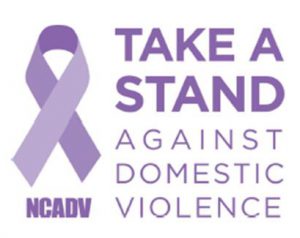 But in reality, abusive behaviors — whether overt or normative — aren’t dependent on the recipient’s sensitivity level or even their actions. A person’s abusive actions are always their responsibility — that person has the choice every time to say “no” to him- or herself, that he or she will not act out a certain way that could violate the other person, physically or emotionally.
But in reality, abusive behaviors — whether overt or normative — aren’t dependent on the recipient’s sensitivity level or even their actions. A person’s abusive actions are always their responsibility — that person has the choice every time to say “no” to him- or herself, that he or she will not act out a certain way that could violate the other person, physically or emotionally.
Your home should always be a safe place to be — in every way, and that includes verbally and emotionally.
Daily tip: 9 principles of peace activism and social justice
Safety and security don’t just happen…
Contractors and owners of a building got to understand fire watch requirements intimately . In some cases, companies might overdue the hearth , because they assume that the need is 24 hours per day while in some cases the need is 24 hours each day watch and therefore the requirements aren’t met. within the first case, the client is overpaying a big amount for a watchman to conduct a short time he faces a hefty fine within the second case because he’s not following the hearth marshal’s requirements. Additionally, he faces liability up to prison time just in case there’s a fireplace . Fire protection prioritizes the safety of one area from another. This is very crucial if you want to ensure that your facility stays fire-proof. To get the best results from your fire partition efforts, you need to understand the various fire resistance and barrier options required. Fire partitions and barriers are special fire rated barrier structures set up with the sole intent of preventing the fire from getting into other rooms in a building or by preventing collateral damage to other critical components of your infrastructure.The National Association of Home Builders’ website allows clients to search for remodeling professionals based on the desired geographic location. The website provides contact information for each professional, making it easy to hire contractor that have ir35 contracting elegibility. The website also features a list of helpful resources to educate homeowners on the remodeling process. On the National Association of the Remodeling Industry’s website, prospective clients can search by geographic area as well as by the professional’s specialty. Clients can also search the database for a specific company. At Sinisi Solutions LLC, we want to know what are you protecting and what are you protecting it from so we can offer you World Class “Safe By Design” solutions that meet your goals and objectives… Always Protecting™
Many clients that are required to stay a fireplace haven’t addressed a watch before or don’t understand the local requirements or the wants the hearth marshal has set forth. an honest company will always engage with best company Fire Watch Security Denver, who will provide expertise, experience, and extra service at no additional cost. He will contact the hearth marshal to work out the small print of the fires and can found out an idea accordingly. the small print of a watch include, but aren’t limited to the precise location the hearth watch has got to be conducted at, the periods, a particular protocol of the proof paperwork requirements, number of security guards and supervisory requirements. In any case, a adviser will obtain all that information and found out a watched plan consistent with the wants .
Choosing the right place to live with your family is not always that easy, and for the past years, after Sea Horizon, Pasir Ris has seen not much launch except 2020 will see an upcoming mega launch that is The Ryse Residences where the neighborhood is peaceful and amenities are situated close to homes.
A security company with experience in conducting watches are going to be ready to start a fireplace watch with a moment’s notice. A watchman with the required skills and expertise are going to be dispatched and can meet with the responsible party until a adviser are going to be ready to check out the property, ask the hearth marshal and make a fireplace plan. it’s important to rent security guards with experience in conducting fire because a fireplace watched doesn’t contains simply guarding a property. the safety guard must remember of his responsibility and therefore the exact protocol of the hearth watches. Many watches require exact locations to be patrolled frequently, the safety officer must search for the littlest signs of fireside , smoke or a gas leak and write detailed and timely reports. If a log isn’t maintained properly it’d cause extremely high penalties by the hearth marshal.
A good security company will manage the hearth watches process from starting to end and can provide the contractor with the peace of mind to specialise in the work he was hired to try to to . Fire watched requirements may change during the hearth and a adviser are going to be in direct contact with the hearth marshal to make sure that the watch plan is adjusted as changes are required. Experienced security guards, field supervisors, and security consultants will make the method much easier and can make sure that clients are shielded from liabilities and fines.
Daily tip: Hope for peace
Best Seat in the House
Add your own photo to API’s Community of Peace and “heart” your favorite.
Speaking peace
Editor’s Note: This post was originally published on 2/9/2015. Written by Lysa Parker & Barbara Nicholson, API cofounders and coauthors of Attached at the Heart — this article captures the essence of Attachment Parenting, and this year’s AP Month 2016 theme, “Nurturing Peace: Parenting for World Harmony.”
We often reflect on whether or not API has made a difference in our efforts toward peace. API isn’t about promoting just parenting strategies: We have a broader long-term vision we have often described as “peaceful parenting for a peaceful world.”
We are living in a time in history that is both grave and great.
I heard a commentator say once that “stumbling into peace is better than rushing to war.” That is not a strategic plan for peace, and we know that governments and nations are less likely to make that a priority. It is the citizens, each and every one of us, who will create lasting change.
We know that, like punishment, war provides temporary results. So, as our world goes through its painful transformations, we continue to do the work of peace each and every day in our homes. We tend to want to have a quick fix, but the most lasting and effective peace will take generations.
Those of us involved with API do so because we want to be a part of something bigger than ourselves and to have an anchor in our own lives to help us transform, to undo our own negative internal programming, to learn to live — and speak — peacefully.
 In a real sense, we are pioneers in creating a new paradigm in parenting and living.
In a real sense, we are pioneers in creating a new paradigm in parenting and living.
It isn’t easy, and as we learn, we will make mistakes. But from those mistakes come wisdom. We can’t let our mistakes immobilize us, but let us look at those times as opportunities to understand ourselves. Our support group community provides us with a net of safety to share, to be validated and supported.
API Support Groups are a foundational community for practicing peace, with our children and each other. These communities provide the opportunity to practice and engage in the language of peace: Nonviolent Communication (NVC).
This language style has and continues to teach me so much. I wish I had known about NVC when my children were small. Still NVC benefits me as an adult, both in talking to my grown children and other adults. NVC creator Marshall Rosenberg gave all of us a gift of skills that teaches us to:
- See the need behind the behavior
- Give us the vocabulary for our feelings and needs
- Teaches us to use “power with” rather than “power over” our children
- See each other’s humanness at the need level
- Move away from punishments
- Bring about peaceful change that begins with working on our own mindsets
Gordon Neufeld of the Neufeld Institute and Gabor Mate have also made major contributions to our understanding and skills to parent peacefully. They have taught us to look past our child’s behavior to find the unmet needs and strengthen parent-child connections.
That’s a radical departure from our culture where we feel we have to punish for every misdeed.
What we say and how we say it can make the difference between building relationships or breaking them down. We have to learn this new language of peace to accompany our actions toward peace, beginning in our own families. It is the essential component toward creating a peaceful world.

